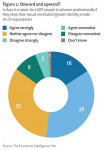World counts on Chinese consumers to spend more, but new survey suggests they will remain cautious
These are among the findings of A better life? The wants and worries of China’s consumers, a new report from the Economist Intelligence Unit, sponsored by Bayer. The report, commissioned to coincide with the Shanghai Expo, is based on two wide-ranging surveys of urban and rural consumers (1,650 and 1,001 households, respectively; see details below) aimed at gauging their confidence and consumption priorities. It assumes that in order for Chinese consumption to be truly unleashed, consumers need to feel confident that life is getting better. If they are worried about basic needs such as healthcare and education, they will be less likely to spend.
Other findings of the report include the following:
· Optimism, even among relatively poor farmers, is high ... Across both of the survey samples, 91% of respondents said they are optimistic about the future. This confidence should translate into expenditures: among the relatively well-off urban dwellers surveyed, only 17% said they were reluctant to spend money.
· … But even the well-off remain big savers. In theory, wealthier consumers should be more confident and more willing to spend. Although our urban survey respondents are relatively well-off financially, are well-educated and have good jobs, we found their reported savings rates to be quite high. In tier 1 cities such as Shanghai and Beijing, 67% of respondents said they saved one-quarter or more of their household income, and 33% said they saved 35% or more. (The Swiss, by comparison, had a savings rate last year of 14.8%.) In less-developed tier 2, 3 and 4 cities, the figures were even higher. Children’s education was the top reason for saving, followed by retirement and medical emergencies, rather than for purchase of consumer goods.
· … And hesitant borrowers. In tier 1 cities, 75% of respondents said they had relied on their own earnings or on family and friends to finance the purchase of the home where they lived (all respondents were homeowners). In tier 4 cities, that figure rose to 83%. This thinking appears to be deeply ingrained. Although 61% of urban respondents plan to buy a new home, they do not plan to borrow much to finance it. Respondents in tier 1 cities seemed more willing than others to take on debt—47% said they would borrow between 30% and 50% of the price of a new home. But 23% said they would borrow nothing.
· Everyone wants a car—but many are also worried about pollution. At 61%, car ownership among the relatively well-off urban consumers surveyed is much higher than the overall penetration rate for cars of 28 per 1,000 people in China. Not surprisingly, many more of our respondents plan to buy a car. At the same time, however, concern over air pollution is pronounced—54% cited it as the thing they would most like to change about the area in which they live, and 53% cited it as one of their greatest concerns about the future.
· The passion for property will continue, but focus could shift to quality. The relatively well-off urban survey respondents are playing a significant part in China’s booming property market—42% already own two or more properties, and 61% plan to buy a new home in future. While these consumers will undoubtedly continue to use property as an investment vehicle, they will also be looking to upgrade their own living conditions. Many already live in newer homes, but new does not necessarily mean good quality. Asked what they would like to change about their living conditions, slightly more than two-thirds of respondents said they wanted to make their homes more comfortable by having such things as better temperature control.
· Healthcare is the number one concern of both urban and rural consumers, but for different reasons. With the national healthcare reform programme still being rolled out, it is not surprising that health is a big concern. Among rural respondents, 84% cited health as their greatest concern for the future, and they were most worried about the cost of healthcare: 61% cited cost as the biggest healthcare issue facing their household. Of the relatively well-off urban survey respondents, 60% said they were concerned about health in the future. But their concerns were the opposite of those in the countryside—49% cited the quality of doctors and hospitals as their biggest health-related challenge, with only one-third concerned about cost.
· To encourage rural consumption, more needs to be done to address basic concerns. The farming households surveyed showed a relatively weak inclination to consume—few were planning to upgrade the goods they already owned, or to make more expensive purchases in the near term. More than 40% of the rural survey respondents said their greatest desire for the next ten years was to see their children go to university. This ranked far ahead of a new home (22%) or any other desire. This finding reflects our rural respondents' vision of the future: only 21% want to give up farming, but a staggering 95% said they did not expect their children to be farmers. Moreover, 72% said they planned to rely on their children financially in old age. Overall, this suggests that more needs to be done to address rural respondents’ broader concerns about the future before programmes aimed at stimulating consumer demand can be more effective.
About the surveys
The surveys, conducted between December 2009 and March 2010, spoke to two very different groups of consumers, encompassing some (but by no means all) of the diversity within China. In one group are relatively well-off urbanites (1,650 households across 50 cities). In income terms, the sample falls in the top 21% of the population in cities. The respondents all have white collar jobs, own at least one property and have at least one-third of their income available for discretionary spending. With fairly secure finances, high education levels and few material wants, this group should be feeling very confident.
In the other group are relatively low-income farming households. The 1,001 rural households surveyed largely make their living selling agricultural products, not from working in a factory or on a construction site. While relatively poor compared to the urban sample, the rural consumers who participated in our survey are no less important. They have been the focus of efforts by the government to reduce the gap between urban and rural living standards, and are also the target of stimulus programmes specifically aimed at encouraging more private consumption by rural households.
About the Economist Intelligence Unit
The Economist Intelligence Unit is the business information arm of The Economist Group, publisher of The Economist. Through our global network of more than 650 analysts and contributors, we continuously assess and forecast political, economic and business conditions in more than 200 countries. As the world's leading provider of country intelligence, we help executives make better business decisions by providing timely, reliable and impartial analysis on worldwide market trends and business strategies. For more information, please visit www.eiu.com or follow us on www.twitter.com/theeiu
웹사이트: http://www.eiu.com
연락처
Joanne McKenna
+44 (0)20 7576 8188
이메일 보내기
이 보도자료는 Economist Intelligence Unit가(이) 작성해 뉴스와이어 서비스를 통해 배포한 뉴스입니다.




